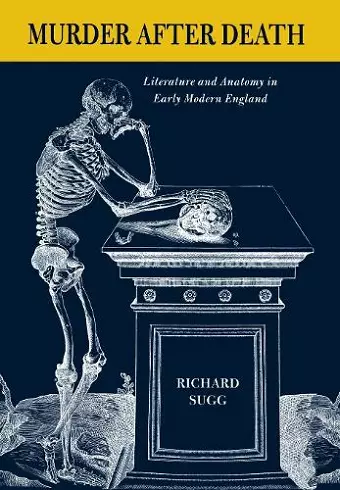Murder after Death
Literature and Anatomy in Early Modern England
Format:Hardback
Publisher:Cornell University Press
Published:23rd Feb '07
Currently unavailable, and unfortunately no date known when it will be back

Just as museum exhibits of plastinated corpses, television dramas about forensics, and books about the eventual fate of human remains provoke interest and generate ethical debates today, anatomy was a topic of fascination-and autopsies a spectator pastime-in England from the mid-Elizabethan era through the outbreak of civil war. Rather than regard such preoccupations as purely macabre, Richard Sugg sees them as precursors of a profoundly new scientific and cultural discourse.
Tracing the influence of continental anatomy on English literature across the period, Sugg begins his exploration with the essentially sacralizing aspects of dissection—as expressed, for instance, in the search for the anatomical repository of the soul—before detailing ways in which science and religion diverged from and eventually opposed each other. In charting this transition, Sugg draws his evidence from the fine detail of literary language, moving from sermons to plays, medical textbooks to sonnets, and from sensational short tales to Thomas Nashe's proto-novel The Unfortunate Traveller.
As Sugg shows, the study of anatomy first offered to positively revitalize many areas of religious rhetoric. In time, however, the rising forces of early scientific enquiry transformed the body into an increasingly alien and secular entity. Within this evolution the author finds a remarkably rich, subtle, and unstable set of attitudes, with different forms of violence, different versions of the interior body, and implicit social, religious, and psychological stances variously cooperating or competing for supremacy.
Richard Sugg has written an impressively interdisciplinary work, one that combines science, literary analysis, and medical history. In the end he claims that 'it was writers rather than experimenters who first grasped the direction and potential of this new form of medical inquiry.' Physicians might take umbrage at the natural, irresistible reflex to defend and magnify one's own metier, but that should not prevent anyone interested in early modern literature and medicine from reading this book.
* JAMA *Sugg's is a lissom mind, capable at once of bold claims (for Europeans, anatomy was a 'preferable form of aggression' to cannibalism) and sophisticated new readings of familiar texts. The book is finely produced, engagingly written, and replete with odd, grotesque lore. In its breadth of reference and depth of reading, it is a remarkable achievement.
-- Stephen Pender * Times Literary SupplemeISBN: 9780801445095
Dimensions: 235mm x 155mm x 22mm
Weight: 907g
280 pages